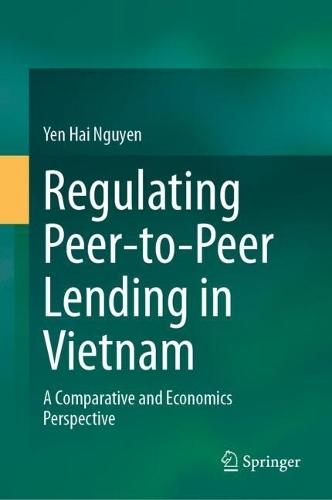Overview
Technological innovation has been a major catalyst for the financial sector's progression, leading to the emergence of peer-to-peer (P2P) lending as a novel source of small-scale funding. This book undertakes a comprehensive examination of the regulatory framework governing P2P lending in Vietnam, illuminating the diversification of risks inherent in this lending industry. While P2P lending is anticipated to address the credit gap and enhance financial inclusion in Vietnam, it concomitantly poses potential risks for all stakeholders. Utilizing fundamental economic tools, the book conducts a comprehensive analysis, demonstrating that apprehensions regarding these risks are not inflated. In the context of the Vietnamese government's endeavors to identify legal solutions to P2P lending operations, the book undertakes a comparative analysis of risk diversification strategies in micro- and/or small-sized financing schemes in Vietnam, the United States, and Japan. The book's proposed solution to mitigate risks for lenders in P2P lending through a collective funding scheme draws from legislative experiences in the United States and Japan, and it further explores how this innovative approach benefits borrowers and platform service providers, ensuring a balanced and secure lending environment. The book aims to contribute to the literature on regulatory practices for small finance in Vietnam and emerging markets, providing insights and practical solutions for effective regulation.
Full Product Details
Author: Yen Hai Nguyen
Publisher: Springer Nature Switzerland AG
Imprint: Springer Nature Switzerland AG
ISBN: 9789819695041
ISBN 10: 981969504
Pages: 317
Publication Date: 23 August 2025
Audience:
Professional and scholarly
,
Professional & Vocational
Format: Hardback
Publisher's Status: Active
Availability: Not yet available

This item is yet to be released. You can pre-order this item and we will dispatch it to you upon its release.
Author Information
Nguyen Hai Yen is a lecturer at the Department of Financial and Banking Law, Faculty of Economic Law, Hanoi Law University, Vietnam. She holds an LLD and an LLM from the Graduate School of Law in Kyushu University, Japan, as well as an LLM and an LLB from Hanoi Law University. Her previous experience includes working as a legal consultant for law firms. Her research has focused on financial law, banking law, securities law, with a particular emphasis on fintech law. Her current publications include Fintech in Vietnam and its regulatory approach, in Fenwick, Uytsel and Ying eds. Regulating fintech in Asia: global context, local perspectives (Springer, 2020); Addressing AML challenges in Vietnam’s fintech and defi ecosystem: bridging regulatory gaps for financial stability. International Journal of Law 11(3) 2025, pp. 1-6.



